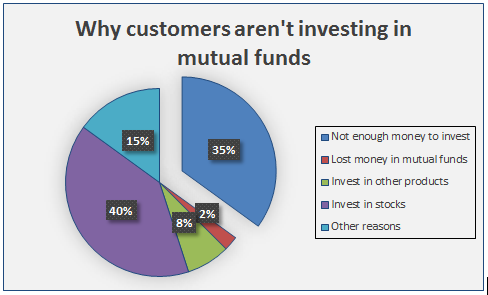Thanks to the general rise in financial awareness and the Mutual Funds Sahi Hai campaign by AMFI, most people now know how important it is to invest in mutual funds. Many of you probably want to get started right away too. But you don’t. Why? As per a survey that we conducted last month, one of the leading answers is a lack of money. The survey asked people why they were not investing in mutual funds, and 35 % (i.e. 1 in 3 people) said they did not have enough money to invest.

It’s understandable for someone just beginning their career to feel strapped for cash. However, some of the respondents who said they have no money to invest were in their late 20s and early 30s. By the time you reach this age, you should ideally have started some investments for your various life goals. By delaying your investments further, you could miss out on a lot of financial growth, leading you to take unnecessary risks later in life.
Of course, from your rents to student and/or vehicle loans – there are several expenses that take a bite out of your salary. Add your food and other living expenses to the list and it’s easy to feel that you have hardly any money left.
However, with some smart budgeting, a few small changes, and a useful investment tool, you’ll soon find that you do have enough to invest in mutual funds!
Change 1: Use small savings to fund your investments
The first thing you need to do is make a note of all the small expenses you make on a daily basis. These could be soft drinks, a packet of chips, a few cigarettes, the auto you take instead of walking the last leg to your house, etc. See if you can forego any one of these every day.
This should help you save at least Rs. 30 – 35 a day, which translates to about Rs. 1,050 a month. While it seems like a small amount, when invested right, it could help you build a lot of wealth!
You can also save more by not eating out too often. Eating out regularly is not good for your stomach or your wallet. Instead, try cooking at home some days. I managed to save an extra Rs. 2,000 a month when I started cooking! This extra money could then be diverted towards your investments.
Trust me, your stomach and your future self will thank you for it.
Change 2: Save money before it ‘disappears’
Now that you know how to save up enough to invest, here’s a foolproof way to ensure this money does get invested: invest your money at the start of every month.
When it comes to saving and investments, most people try to save what’s left in their accounts after they spend, But that rarely works. A sad truth about life is that unless you’re following a smart budget, your expenses automatically rise to meet your income. Worse, some people who do manage to save up money at the end of the month splurge it all the day before the salary arrives instead of saving or investing it!
Instead, you should treat your investment as a bill to be paid at the start of every month (preferably right after you get your salary), and then spend what’s left after paying off all your bills. To help with this, you can schedule your investments for the start of every month.
Investing in SIPs – Using small savings for big returns
Now that you’ve put these savings together, it’s time to put them to use. The easiest and best way to start investing this money is to start a Systematic Investment Plan (SIP) in mutual funds.
A SIP is a method of investing that automatically invests a fixed amount in your chosen mutual fund scheme(s) at regular monthly intervals. SIPs allow you to:
-
Start small – You can start a SIP in a mutual fund scheme for as little as Rs. 1,000 a month, which is roughly what going to a movie with your family could cost you. But unlike a movie, this Rs.1000 actually helps you save for bigger things – from your child’s education to a fancy overseas vacation!
-
Forget about timing the market – With a SIP any time is a good time to invest as, by investing the same amount regularly, SIPs make you invest across market phases, giving you better returns without zero effort!
-
Relax – In a SIP, the investment amount is automatically debited from your bank account each month, so you’ll never miss an instalment!
So, all you need to do to make use of your small savings is to pick a good fund, an investment date that works, and start a SIP! Of course, picking a fund is difficult for a beginner. That’s why you need to enlist the help of a good advisor (like the in-house advisory team at FundsIndia).
One last thing: as you salary increases, remember to increase your investments too. One way to do this is to pretend you got only half the raise (or no raise at all) and using that ‘missing’ money to bump up your investments.
So, do you still feel you don’t have enough to invest?
Other articles you may be interested in:
7 Reasons to start a SIP
SIP – The winning recipe to build wealth
BUT… The three letter word stopping you from becoming wealthy
7 reasons why you should invest in Mutual Funds










